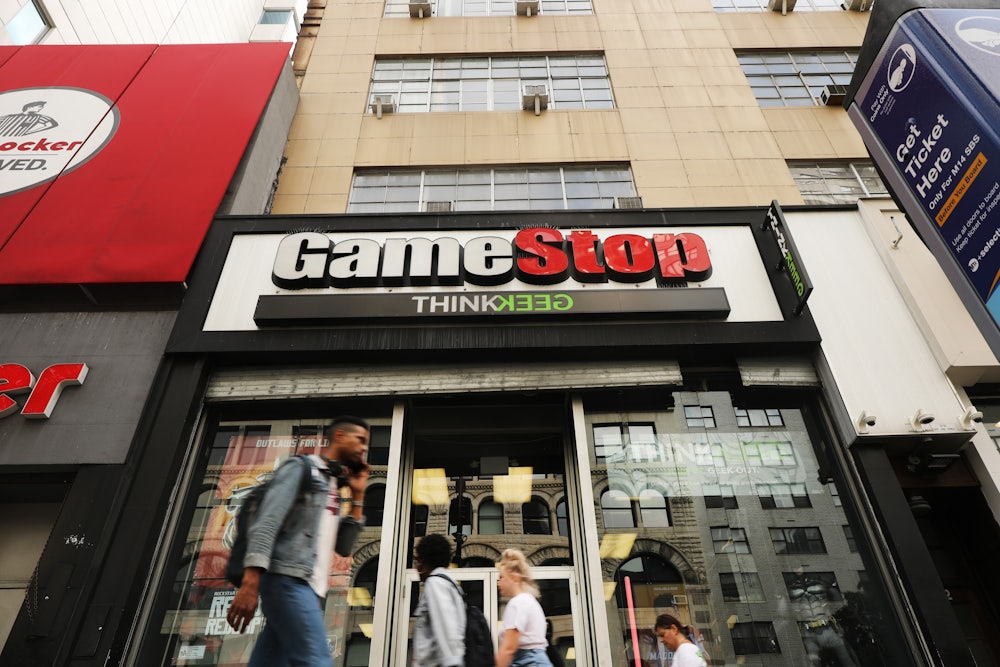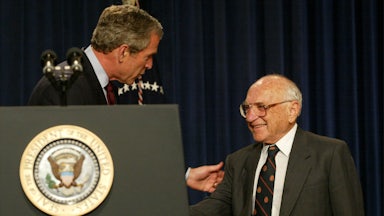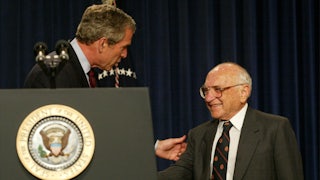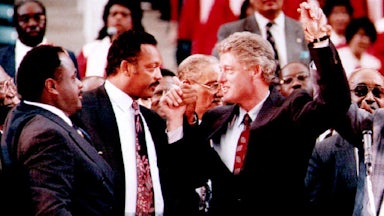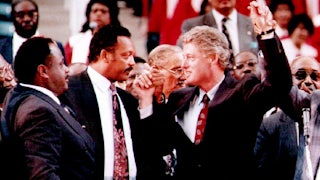For a brief moment on Wednesday afternoon, CNBC anchor Scott Wapner appeared to be on the verge of an epiphany. Wapner was, in that moment, in a heated debate with venture capitalist Chamath Palihapitiya about the value of GameStop, the brick-and-mortar gaming retailer whose stock price had been rising exponentially after a group of Reddit users banded together to inflate its share value—and punish the hedge funds that had been shorting its stock. “I still haven’t heard you tell me what the fundamental case is for GameStop at $350,” an exasperated Wapner said. “There’s no fundamental reason why they’re there. They’re trading [at that value] because there’s this momentum cohort behind it” on Reddit and the now-infamous day trading app Robinhood.
This was an argument you heard again and again from the titans of financial media as this chaotic, Reddit-driven assault on Wall Street’s sense and sensibilities progressed over the course of the week: What was happening with GameStop was fundamentally wrong. The free market, after all, had decided that the value of the flailing video game retail empire was around $18 a share; now it had multiplied twentyfold because a bunch of bored gamers with stimulus checks and time on their hands were in it for the lols. CNBC’s Carl Quintanilla took to Twitter to question the merits of fiscal stimulus itself, writing, “How does [Federal Reserve Chair Jerome] Powell endorse trillions in fiscal stimulus on a day like this,” with an image of the booming stock prices of GameStop, the currently shuttered movie theater chain AMC, and other companies being boosted by the subreddit r/WallStreetBets.
CNBC anchor Joe Kernan, a free-market dogmatist, demanded the Securities and Exchange Commission take control of the situation. Numerous commentators referred to these chaotic neutral day traders as being motivated by “greed”—what a concept! The New York Times’ Andrew Ross Sorkin, meanwhile, wondered if it was time to do what we should have done in 2008: blame the little guy. “I covered the financial crisis + I watched all the finger pointing in its aftermath,” he tweeted. “The blame was on the banks. It was uncouth to raise the idea that some regular folks made mistakes or speculated. When $GME music stops, watch the people on here pumping it blame someone else.”
The message from financial media was loud and clear: Won’t someone please think of the hedge funds? You—a poor slob—might think what was happening was amusing. You might even see this as an act of populism, the little guy taking on extraordinarily wealthy people who bet on companies failing (and often help make them fail in the process). But what was happening was wrong, bad, no! This is not how things are supposed to work!
The GameStop saga may very well end in tears, or worse. On Thursday, Robinhood halted trading of GameStop and AMC, a decision aimed at clipping the wings of the rabble-rousers who had briefly seized control of the market. But it has already been revealing—not just about how the stock market works, but also about how financial media works.
The financial cable news networks are ostensibly aimed at the sort of person who posts or lurks on r/WallStreetBets—normies interested in the stock market and the economy, keyed up to get hold of that One Weird Trick to Get Rich that hurdy-gurdy stock hypeman Jim Cramer might shout at any moment. The programming on offer across these various networks promises to provide viewers with the True Scoops needed to make informed investments. But there is not, and never has been, anything populist about the way these networks operate. These networks are all about upholding the sanctity of the Blessed Market and protecting the interests of their high-faluting financial sector guests—the people who run hedge funds and corporate oligopolies, who are the keymasters of this universe. The interests of the audience are secondary. Anyway, they can feast freely on the scraps of their betters!
The Tea Party movement, launched by a CNBC-broadcast rant from Rick Santelli from the floor of the Chicago Stock Exchange, may be remembered by some as the igniting of a “grassroots” movement, but in that moment, it was anything but: Santelli’s rant explicitly defended the financial services sector against the predations of the “losers” who had lost their homes in the foreclosure crisis after that same financial services sector scammed them into rigged mortgages. This is one reason why Sorkin’s odd insistence that the banks were exclusively blamed for the financial crisis was so bizarre: The call defending those banks came from inside the house.
Media criticism has been a driving force behind what the traders from r/WallStreetBets have been up to over the last few weeks. An open letter posted on the subreddit by one of its administrators decried CNBC’s coverage of the GameStop rally, accusing it of showcasing “contempt for retail investors (your audience)” and warning that it was losing a generation of day traders and finance junkies by backing hedge fund titans over small-time investors. “These funds,” the administrator’s post continued, “can manipulate the market via your network and if they screw up because they don’t even know the basics of portfolio risk 101 and using position sizing, they just get a bailout from their friends at Citadel,” they wrote, referring to the money that Ken Griffin’s hedge fund has poured into its over-leveraged and besieged brethren. Class solidarity for the rich is alive and well.
The aforementioned contentious and widely shared interview between CNBC’s Scott Wapner and Social Capital CEO Chamath Palihapitiya doubled as an act of media criticism. Wapner chased after the logical reason that a long-in-the-tooth video game retailer, or AMC Theaters—whose chains have been lying mostly dormant during the pandemic—should be hitting absurd peaks in share value in an ordered universe. But Wapner hadn’t been listening: Palihapitiya had undermined this premise moments earlier by asking if the CNBC host would apply the same argument about value to Tesla, whose shares have risen tenfold over the last several months. The idea that the free market was accurately valuing these companies was absurd long before a bunch of Reddit users with names like “r/ssauronn” entered the picture.
This is the uncomfortable reality that r/WallStreetBets has exposed—there is nothing objectively true about valuation of these firms. Moreover, hedge funds use momentum and, most importantly, mass media—namely networks like CNBC—to pump the value of stocks they have interest in all the time, and despite insistences to the contrary, often not for productive purposes. The big difference between what has happened over the past couple days and what normally happens is that a bunch of investors took their cues from Reddit instead of financial news, and it fucked with the hedge funders’ money.
“Just because you’re wrong doesn’t mean you get to change the rules,” Palihapitiya said. And yet that is what’s happening. The Reddit traders were beating hedge funds at their own game, and the financial media was aghast. Instead of acknowledging that these day traders were simply playing by the same rules as the industry’s most powerful funds, only using different tools—it treated them as cheaters. The rules got temporarily changed, trades were halted in the style of Calvinball, and a crackdown has followed to reset the thumb on the scale in favor of the plutocrats; GameStop’s value has since fallen back to earth, though for how long no one can really say. A sense of “normalcy” will undoubtedly return to the market one day; CNBC and Fox Business will resume regularly scheduled programming. But while the last few days likely won’t fatally shake the bedrock of the financial media, it has revealed some substantial cracks in its foundation, through which everyone can see with new clarity who these media organizations truly serve.
